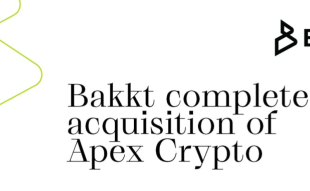Join Our Telegram channel to stay up to date on breaking news coverage
In the midst of the ever-evolving cryptocurrency ecosystem, Oliver Linch, the CEO of Bittrex Global, has presented an insightful viewpoint.
Linch suggests a different approach; rather than following the traditional financial structures, he believes that the cryptocurrency world should create its own unique position within the broader traditional finance landscape, known as TradFi.
Linch’s viewpoint comes from his observation that regulators in various jurisdictions, including the United States, tend to analyze and evaluate cryptocurrencies from the lens of conventional financial systems. He argues that this approach undermines the innovative potential inherent in the burgeoning crypto industry.
To unlock the full growth and acceptance of cryptocurrencies, Linch advocates for a paradigm shift in how we perceive and assess them. He proposes that cryptocurrencies should be recognized not as replicas or extensions of traditional financial products but as a distinct and independent component within traditional finance.
While adhering to the fundamental principles governing other financial products, Linch envisions cryptocurrency standing alongside securities and derivatives as another integral element of the traditional financial landscape. By embracing this perspective, the industry can foster the seamless integration of cryptocurrencies into TradFi.
Envisioning the Integration of Cryptocurrency in Traditional Finance
Looking ahead, Linch outlines a future where cryptocurrencies seamlessly blend into the fabric of traditional finance. He suggests that within a timeframe of 5 to 10 years, cryptocurrencies should achieve full integration into traditional financial systems.
In this future landscape, events such as Bitcoin Miami, which primarily focus on the crypto industry, would become unnecessary, signaling the normalization of cryptocurrencies within the broader financial sphere.
These forward-thinking views from Linch arise at a time when Bittrex, the cryptocurrency exchange, faced significant regulatory and economic challenges in the United States.
The company’s U.S. division recently filed for Chapter 11 bankruptcy, citing an increasingly ambiguous and unevenly enforced regulatory landscape as a major factor in its decision to wind down operations.
Richie Lai, the esteemed co-founder and CEO of Bittrex, draws attention to the dynamic and ever-changing characteristics of the cryptocurrency ecosystem, which significantly impact the ambiguity surrounding regulatory obligations.
Lai candidly expresses apprehension regarding the insufficiency of meaningful deliberation and collaboration in the implementation and enforcement of these regulations, resulting in a landscape where competition is skewed and uneven.
Lai openly shares his concerns about the lack of thoughtful discussion and cooperation in enforcing regulations, which leads to an unbalanced and unfair competitive environment.
Despite the setback of winding down operations in the United States, Bittrex Global remains steadfast in its commitment to driving the global crypto revolution. Linch’s visionary approach aligns with the company’s goal of integrating the crypto world into traditional finance.
To sum it all up, Oliver Linch, the CEO of Bittrex Global, offers a fresh perspective on the positioning of cryptocurrency within traditional finance. He advocates for recognizing crypto as a unique component rather than attempting to fit it into pre-existing financial structures.
He envisions a future where cryptocurrencies seamlessly integrate into traditional finance within the next 5 to 10 years. Despite the challenges faced by Bittrex in the United States, the company remains dedicated to advancing the crypto revolution and reshaping the financial landscape.
Regulation Remains Critical in Integrating Cryptocurrencies into Traditional Finance
As the cryptocurrency industry continues to evolve, one crucial aspect that cannot be overlooked is the role of regulation in facilitating the integration of cryptocurrencies into traditional finance. Oliver Linch’s thought-provoking perspective highlights the need for a shift in how regulators approach and evaluate cryptocurrencies.
One of the major hurdles faced by the crypto industry is the ambiguous and ever-changing regulatory landscape. Linch’s observation regarding the tendency of regulators to evaluate cryptocurrencies through the lens of conventional financial systems sheds light on the challenges faced by the industry. The lack of a clear and consistent regulatory framework creates uncertainty and hampers the growth and acceptance of cryptocurrencies.
To achieve the seamless integration of cryptocurrencies into traditional finance, it is crucial to adopt a new regulatory approach that recognizes the unique nature of these digital assets. Instead of trying to fit cryptocurrencies into existing financial structures, regulators should consider them as a distinct and independent component within traditional finance.
Linch emphasizes the importance of countries that actively engage with cryptocurrencies and develop strong regulatory regimes. These proactive approaches enable regulators to better understand the crypto ecosystem and create frameworks that balance innovation and investor protection. By fostering a collaborative environment and promoting meaningful dialogue, regulators can address the challenges and uncertainties associated with cryptocurrencies.
Regulators play a vital role in striking a balance between fostering innovation and protecting investors. Linch’s vision of integrating cryptocurrencies into traditional finance requires regulatory frameworks that promote fair competition, safeguard against fraudulent activities, and provide a level playing field for all participants. Clear guidelines and transparent regulations can enhance investor confidence and encourage responsible growth within the crypto industry.
In order to achieve the desired integration of cryptocurrencies into traditional finance, collaboration between industry stakeholders and regulators is crucial. Meaningful discussions and consultations between regulators, industry experts, and market participants can lead to the development of effective regulatory frameworks that address the unique challenges posed by cryptocurrencies.
As the cryptocurrency ecosystem continues to evolve, it is essential to address the regulatory challenges hindering its integration into traditional finance. Oliver Linch’s perspective demands transformative changes on the regulatory end, recognizing the distinct nature of cryptocurrencies.
As the industry excels at fostering collaboration, developing strong regulatory regimes, and maintaining a balance between innovation and protection, it can pave the way for the future integration of cryptocurrencies into traditional finance, leading to a transformed financial landscape.
Related Articles
Join Our Telegram channel to stay up to date on breaking news coverage


